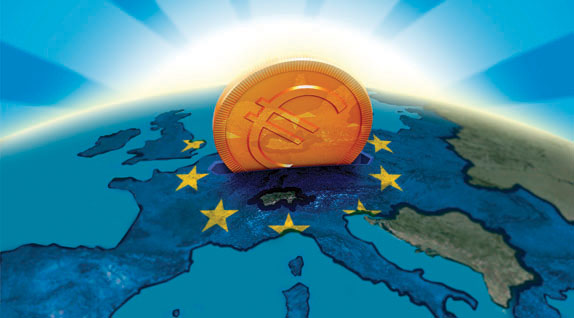 Canstockphoto.com
Canstockphoto.com
Article
The continent’s financial crisis gave rise to bailouts, infighting and demands for sweeping financial reform. Could there still be a bright future over the horizon for the European Union?
Learn the why behind the headlines.
Subscribe to the Real Truth for FREE news and analysis.
Subscribe NowAmid the shift in global superpowers, two names come up as heavyweight world championship opponents: China and the United States.
The constant media exposure and speculation could be likened to a pay-per-view boxing matchup.
In one corner: the world’s largest energy consumer—with a 1.3-billion-strong population—endlessly stockpiling natural resources—and holding nearly $900 billion in United States’ debt.
In the other: longtime democratic world champion—largest economy—and leader in manufacturing.
China is the clear favorite, but the U.S. is still in the running. On its way down from unmatched superpower, it is still a formidable opponent, with its manufacturing sector out-producing China by 40 percent.
Yet America is weighed down by a $14 trillion federal debt and rampant unemployment. Many of its citizens appear to have already given the victory to China. According to a Gallup poll, 52 percent incorrectly think China is already the world’s number one economy.
While there has not yet been a knockout punch, China is certainly the favorite, and America has been slow to recover from each successive blow.
With intense media focus on these two nations, little thought is given to another power in contention for top spot in the global economy: the European Union.
By comparison, the EU is perceived as a washed-up contender, well past its prime, which seems to be sticking to an outdated fighting style. As the continent grapples with persistent financial crises—first in Greece, then Ireland, and now Portugal and Spain—any chance for Europe to quickly rise as a competitor in the world championship ring seems to slip away.
Yet, if the European Union could manage to get its 27 member-states to walk in lockstep, it would immediately boast the world’s largest GDP, with $16.1 trillion to America’s $14.6 trillion, according to the International Monetary Fund. China comes in at a distant third with only $5.7 trillion.
The EU does have a mountain of problems to tackle: debt woes, sharp disagreements between member-states, and a 12-year high in unemployment.
 Francisco Leon/AFP/Getty Images
Francisco Leon/AFP/Getty ImagesWhen Europe is in crisis mode, however, the continent’s full potential shines through. And while no one is looking, the EU is poised to become a serious contender as the world’s top economic power.
Case Against Europe
Talk of a streamlined European Union as the top world leader always brings naysayers.
The global financial downturn uncovered chronic fiscal mismanagement in many EU member-states. And, in a eurozone tied to a single currency, just one nation faltering could be catastrophic. To limit governments from failing, the union conceived the IMF-sponsored $1 trillion bailout fund, known as the Financial Stabilization Mechanism. A nearly bankrupt Greece was the first to receive assistance in June 2010, and the nation appears stable—for now.
Newspaper Deutsche Welle quoted Poul Thomsen, head of the IMF mission in Greece, who gave an update on the nation’s progress: “While there have been some delays and shortfalls, it should not undermine the fact that the program is broadly on track.” He later added, “We are ready for the second phase of the program, having successfully pulled the economy from an abyss.”
After stating this, however, the IMF, European Central Bank, and the European Commission all insisted that Greece move into hurry-up mode and make deeper budget cuts to meet the required goals.
Athens was not pleased. A spokesman for Greece’s government responded, “The behaviour of EU, IMF and ECB officials was unacceptable. We asked nobody to interfere in domestic affairs…We have needs but also limits, and we are not negotiating with anybody the limits of our self-respect. We only take orders from the Greek people” (ibid.).
This exchange speaks volumes about the case against the EU model. A nation will realize that it is part of the collective whole of the EU in one sentence—even accepting a large bailout sum—then demand the EU mind its own business in the next!
Each member-state faces a challenge, making necessary cuts in its nation to help out the eurozone, while somehow keeping the entitlement programs its citizens have grown to expect. Even a hint of cutting pension plans or raising the retirement age means almost certain mass demonstrations and violent protests.
Ireland was the second nation to dip into the Financial Stabilization Mechanism fund. Portugal and Spain seem close behind. One thing is certain: the EU must find a swift solution.
Each EU crisis elicits calls for the continent to work together. In light of the most recent troubles in Portugal, The Economist reported European Commission President Jose Manuel Barroso claimed that “the markets are sending every day a very clear message that Europe has to work in a more co-ordinated manner when it comes to economic and financial issues.”
Growing Divide
Working together has never been a strong suit for members of the EU, and having the continent on the brink of potential collapse is no different. Fiscally stable northern nations loathe the thought of shouldering the brunt of a mess they see as made by southern countries. And most nations lining the Mediterranean cannot imagine a scenario in which sweeping budget cuts will not lead to nation-crippling protests.
Ideological standoffs are not limited to financial recovery methods—they crop up over almost every EU decision. All 27 member-states have competing interests, and any country can opt-out of measures against its interests. For example, only 17 nations in the union use the euro.
On top of opt-outs, coming to a consensus means finding common ground. This is difficult enough in the United States under a two-party system. In Europe, consensus often means toothless resolutions and legislations that are nearly impossible to enforce.
As their economies are tied to the euro, every EU member-state wants to stop nations falling like dominoes into bailouts. To do so, however, it must find common ground about how to tackle the problem.
The north, led by Germany, appears willing to prop up foundering economies, but these “financier” nations want to see real, sustained effort on the part of countries receiving support to balance their budgets.
With Portugal, the next nation that may need assistance, the north-south divide comes into sharper focus. Instead of immediately proposing a bailout sum for “southern” Portugal, “northern” Germany offered up a “competitiveness package,” which proposes raising the retirement age, and set caps on employee salaries and federal spending.
The move has brought criticism from Portugal, which feels Berlin is endangering its economy for German gain. “‘Portugal will continue to do its job’ to end the crisis, Treasury Secretary Carlos Costa Pina said after an auction of treasury bills and a buyback of government bonds as part of its debt-refinancing plan. ‘But Europe has been slow in doing its part,’ he added” (The Wall Street Journal).
“German Finance Minister Wolfgang Schaeuble rejected the notion that richer states are dragging their feet, telling reporters that Europe can act with ‘lightning speed’ to strengthen the bailout fund if needed,” Bloomberg reported.
Germany is perhaps the only EU nation in the position to make such strong demands, as it has weathered the financial storm well, and is now sitting on a sizable monetary surplus. And Europe appears ready to bend to Berlin’s will, as demonstrated by the Montreal Gazette article, “Germany in Driver’s Seat Handling Europe Debt Crisis.”
“Chancellor Angela Merkel is now calling the shots, with France as a distinctly junior partner, setting out demands for economic policy coordination along German lines and using her leverage as Europe’s paymaster to gain acceptance.
“The message from Berlin is: ‘If you want German taxpayers to underwrite the euro zone, you will have to accept German-style fiscal rules in your constitutions, raise your retirement ages and make your economies more competitive.’
“After an initial backlash, European partners seem set to bow to some of Berlin’s demands next month as the price for German agreement to a stronger, more flexible euro zone rescue fund.
“Greece and Ireland, which have already received IMF/EU bailouts, are in no position to argue. Others such as Spain and Portugal, struggling to fend off bond market pressure over their high budget deficits, have little choice but to comply.”
Bankrolling the EU
Germany was not thrilled to bail out Greece. At the time, The Associated Press quoted German Chancellor Angela Merkel as saying the $1-trillion fund did not “do more than buy time to get the differences in competitiveness and budget deficits of euro zone countries in order.”
Since then, Chancellor Merkel has faced a backlash in Germany for supporting the bailout, as seen in mid-February elections in Hamburg, which ended with substantial losses for her Christian Democratic Party.
This first of seven votes scheduled to take place throughout Germany this year are said to test the popularity of Ms. Merkel and her policies. While analysts warn not to over-emphasize these elections, the German nation seems to be sending a definitive message to the EU via Ms. Merkel: “Adopt German-style budgets, or we will let you fail.”
Other individual member-states and the EU itself are still bucking the demands of Germany and other financially stable nations that are starting to call the shots.
“There are limits to creativity in establishing new governance mechanisms and it must not lead to dysfunctions with existing European Union policies,” Mr. Barroso said, as quoted by the Montreal Gazette.
Ms. Merkel rebutted calls from the European Commission and the European Parliament to hold to the “community method”—where all 27 nations have a say—when responding to the eurozone crisis.
“Where there is no community competence, the community method clearly cannot be applied,” she said in a European policy speech last November (ibid.).
EU news analysts have begun to view Germany, with France by its side, as the most important voice in the EU.
The Associated Press: “Standing side-by-side, French President Nicolas Sarkozy and German Chancellor Angela Merkel chitchatted briefly with the [European Union] summit’s host, Herman Van Rompuy, the EU president. But they left no doubt about who really owned the meeting, and the European Union itself. They have formed a bond that has increasingly become the de facto voice and policymaker for all, whether the other 25 EU like it or not.”
The Telegraph: “The crisis also exposes the growing north/south divide in the eurozone, in particular the imbalances between surplus and deficit nations (which are themselves a reflection of a wider global problem). These will have to be corrected, which will inevitably be a long and complex process.” The paper concluded, “All seem destined to become economic satraps of the north, and in particular Germany.”
The New York Times: “And, as Germany’s ability to deliver economically grew compared with that of many neighbors, Mrs. Merkel began talking tougher. At a European Union meeting on economic targets in March 2010 she complained that, if the past were anything to go by, other nations would fall short and the Germans would have to work harder to compensate, a European Union diplomat said.”
If Berlin is bankrolling Europe, it wants to call the shots.
German Model
Germany is not “all talk.” It is one of the few countries that has weathered the financial storm—through belt-tightening and tough-nosed business tactics—and many Germans think the EU must follow suit.
In 2010, Germany’s economy grew at its fastest pace since reunification. Its GDP grew 3.6 percent, well ahead of other wealthy economies. By comparison, America’s GDP grew by only 2.9 percent last year. Of the wealthy G7 nations, Germany stands alone as the only country with a 2010 GDP per person level above its 2007 level. Also, its unemployment rate is at the lowest levels in 18 years—less than 7.5 percent.
According to Agence France-Presse, “German exports grew by 18.5 percent in 2010 to 951.9 billion euros ($1.3 trillion), the national statistics office said…while Berlin’s trade surplus gained 11.2 percent to 154.3 billion.”
Germany’s secret? In part, the “Mittlestand”—an army of small and medium-sized companies, which are generally family-owned. Many of these companies have carved out an often-obscure niche market and dominate that field, such as building machines that produce envelopes or convert tar from old roads to be reused to pave new ones. These firms, which typically have less than 500 employees and are known for attention to detail and financial caution, are the heart of the German engine.
Big business is also booming in Germany. For example, car-maker BMW continues to take advantage of China’s voracious appetite for luxury cars.
Another plus is that Berlin funds areas of research to encourage innovation and continue export growth.
In addition, at the start of the financial crisis, German businesses gambled by holding onto most of their employees, while companies in other nations laid off workers. As the market improved, Germany was already poised to begin to meet demands.
Economists note that Germany does have weaknesses: an aging workforce, few children, and an education system ill-equipped to keep up with the demand for highly skilled workers.
Most important, the nation has an export surplus, meaning both the government and the individual consumer are sitting on large reserves. While this sounds positive, it means money that could stimulate the economy lies dormant in bank accounts.
The Economist article “Germany: Europe’s Engine” describes the country’s stunning turnaround: “A decade ago Germany was the sick man of Europe, plagued by slow growth and high unemployment, with big manufacturers moving out in a desperate search for lower costs. Now, despite the recession, unemployment is lower than it was five years ago. Although Germany recently ceded its place as the world’s biggest exporter to China, its exporting prowess remains undimmed. As a share of GDP, its current-account surplus this year will be bigger than China’s.
“This feat gives the lie to the picture, common in America and Asia, of Europe as a washed-up continent incapable of change. And, for the rest of Europe, there is a lot to be said for having a strong economy at the continent’s geographical and political centre. Yet Germany’s success is paradoxically also causing problems for its neighbours—problems which they, and Germany, need to address.”
These problems have already begun to dissipate. Much of Germany’s 2010 growth did come from domestic demand instead of exports. In addition, Bloomberg reported that business confidence in the nation reached its highest level since records began in 1991. The news is expected to bring an increase in hiring and drive consumer spending.
This is good news for Europe. Future growth in Germany is tied to economic stability in the rest of the EU. To continue economic expansion, Germany must spend to stimulate the EU economy. Also, for the EU to survive, it must accept the help—and a leading voice—from Germany.
Writing on the Wall
The New York Times noted that an assertive Germany “raises a more fundamental question, one with important historical overtones, not just for smaller European countries, but for France as well: Is the rest of Europe ready to accept overt German leadership?”
For 500 years, Europe was the axis around which the world revolved. It was the leader in science, math, business, art, music, education and technology.
During that time, monumental events of history emanated from Europe: the Renaissance, the French Revolution, the Industrial Revolution, and two world wars.
The continent had the richest and most powerful nations, and one nation was consistently the heart of Europe’s power: Germany. Consider the Frankish-Germanic kingdom—the reign of Charlemagne—Otto the Great creating the Holy Roman Empire of the First Reich—the rule of Charles V—and the long-held Habsburg dynasty.
Europe is poised to return as a driving force in world events. In the coming years, uncooperative, underperforming nations will become increasingly irrelevant and the reins of the eurozone will be handed to one streamlined leader.
While the often disunited European Union has long failed to live up to the high hopes it had at its inception, the historical model for a true United States of Europe is there. Given the right mix of EU crises, Europe will be united once again, ready to take on whatever comes its way.
As China rises and the United States continues to take a bow from its role as lone superpower, another powerhouse is emerging on the world economic stage.
Be sure to watch Europe and Germany.
- Real Truth Magazine Articles
- PROFILE
 Nicolas Sarkozy
Nicolas Sarkozy
More on Related Topics:
- How the Deadliest Attack on Russian Soil in Years Unfolded Over the Weekend
- Vladimir Putin Warns West of Risk of Nuclear War, Says Moscow Can Strike Western Targets
- With Lives Shattered by War, Ukrainian Teens Build New Dreams
- Ukrainians Prepare for a Long War. Will the West Stay the Course?
- One Year After Liberation, Ukrainians in Kherson Hold On to Hope amid Constant Shelling


